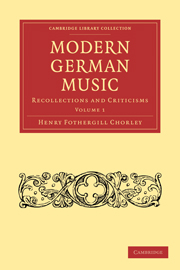CHAP. II - Organ-Playing—1840
Published online by Cambridge University Press: 29 August 2010
Summary
I liked Dresden even better in 1840 than in 1839. The weather was brighter—the town seemed more tranquilly engaging; and the pictures in the Gallery had taken the look of old familiar friends.—Dresden, too, was doomed to be a place of musical compensation to me for failures and disappointments encountered elsewhere. The repayment for Berlin shortcomings, which, in 1839,1 found in my first introduction to “Euryanthe,” took, in 1840, a form more precious— if that could be—because more unique, by bringing me acquainted with the consummate organ-playing of Herr Schneider.
I will not libel any musician by asking him if he be fond of the instrument. The further removed he be from personality in his preferences of Art—the more devotedly addicted to Thought in its noblest, if not most excursive, flights—the more exquisitely will he relish, the more eagerly will he return to those grave and sublime pleasures—to those oracular utterances, as it were, in which musical Truth and Poetry, of the highest order, make themselves known. After a London season of fever and competition and excitement, when the newest wonder-player has been hardly heard before he has been pushed off his stool of popularity by the newest singer— when one strain of music has been hurried out of the memory by some other of a more seizing piquancy,—to find in the midst of the comparative quiet of a German town, and the yet more modest tranquillity of an occupied but not a dazzling career, an instrumentalist who, in his way, might challenge the Liszts and the Paganinis of his century,—was as great a gratification to the mind as his artistic exhibitions were a delight to the ear.
- Type
- Chapter
- Information
- Modern German MusicRecollections and Criticisms, pp. 320 - 340Publisher: Cambridge University PressPrint publication year: 2009First published in: 1854



